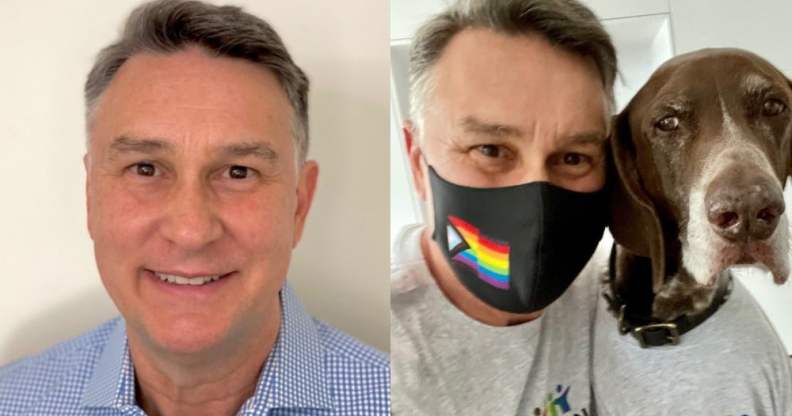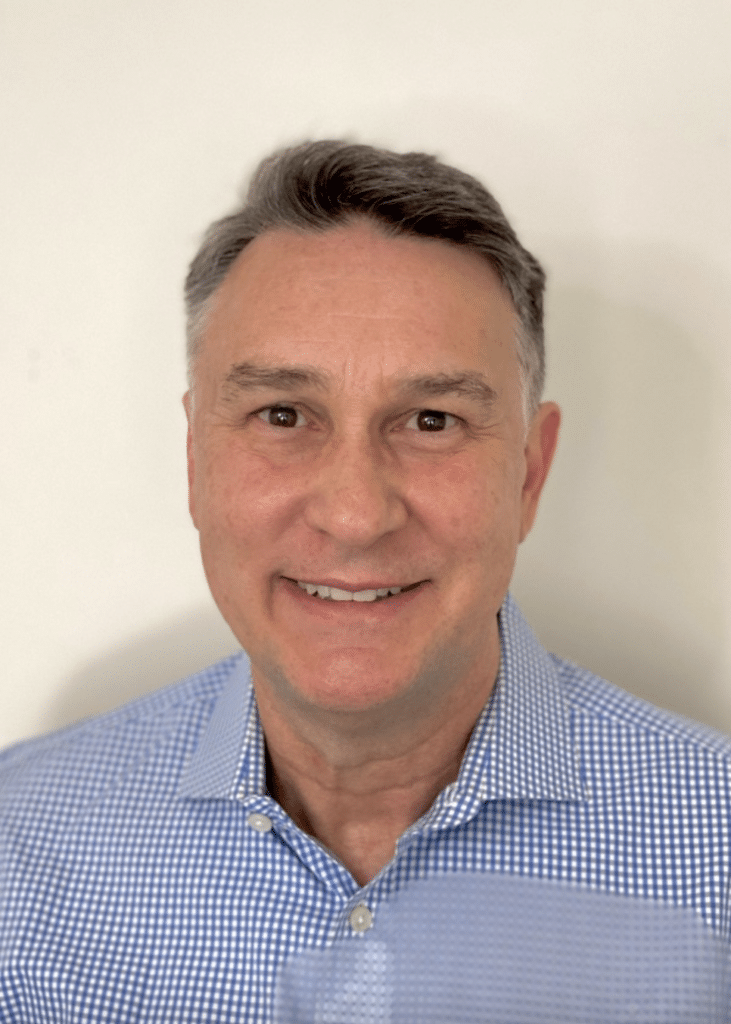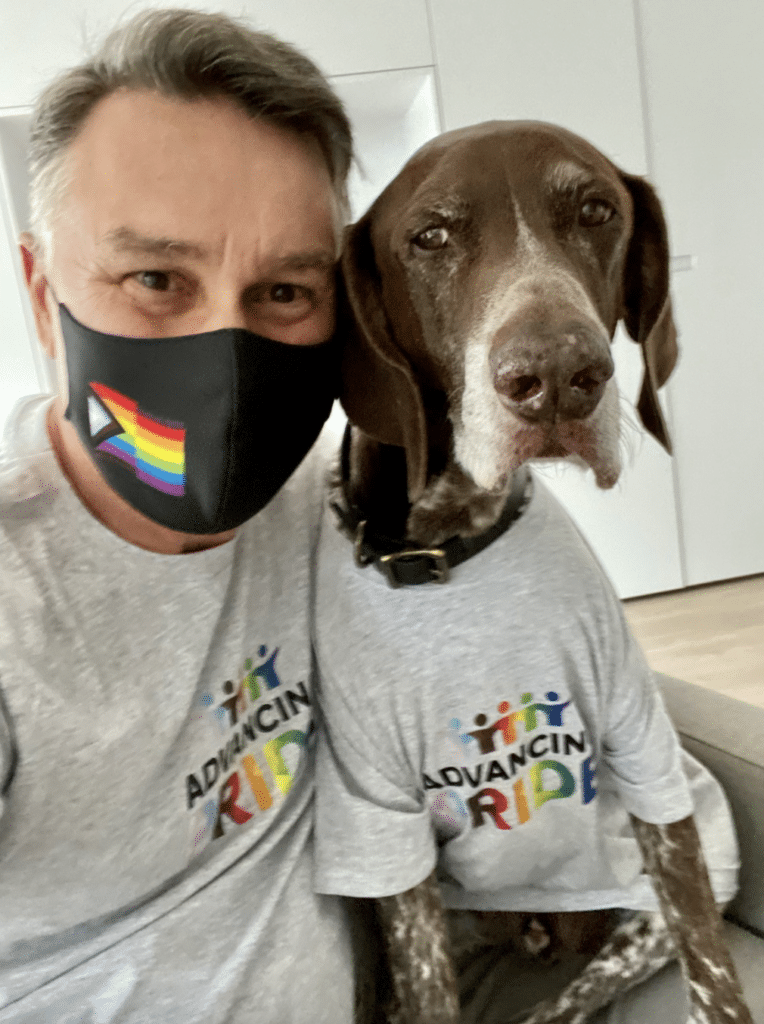Here’s why Gilead’s commitment to its queer employees is more than just lip service

Reggie Kelly serves as the Vice President, Clinical Operations of Gilead Sciences
Reggie Kelly never thought he would be where he is now.
As vice president of Gilead’s new development site in Dublin, Ireland, he lives a life that once seemed unimaginable: married to his husband Alex and, as an out gay man, working in a job that thrills him.
This is many metaphorical miles, and a very real Atlantic ocean, away from Reggie’s upbringing in North Carolina.
Coming of age in the 1980s during the AIDS crisis, he spent a lot of his youth feeling uncertain about the future.

Reggie Kelly is the vice president of Gilead’s new development site in Dublin, Ireland
“We’ve all seen movies and shows about the AIDS crisis now, but that was the formative years of my youth,” he tells PinkNews. “I remember figuring out that in the year 2000, I would be 34, and I hoped I was going to live that long.”
Living through a pandemic that disproportionately impacted people like him, Reggie sought sanctuary in science.
He graduated university in 1988 with a degree in biology and spent the early part of his career monitoring trials for new, life-saving cancer drugs.
His eventual move into pharma has taken him to some fascinating places: first Los Angeles (where he met his future husband), then San Francisco and now Dublin.
Reggie’s work with Gilead feels like a natural partnership.
Human Rights Campaign named the company as one of the best places to be an LGBT+ employee, based on a 100 per cent rating on its Corporate Equality Index for five consecutive years.
He tells PinkNews that Gilead’s approach to LGBT+ employees is different from other companies because inclusion is embedded in their culture all year round.
“Every year Pride month comes around, you’ll get executives at some companies suddenly talking about Pride. Maybe they’ll even put up a flag in the office. But then, for the other 11 months of the year, there’s nothing,” he says. “But there’s constantly something going on at Gilead, whether it’s Trans Day of Visibility, where we had a panel of community leaders talking about the challenges the trans community are facing right now, or different events and groups throughout the year.”
Moving from San Francisco to Dublin was a significant life change. For LGBT+ people, relocating across the world isn’t always a simple choice: what will life be like in a new place? Will it be safe and accepting?

Reggie Kelly is a gay man who came out during the AIDS crisis
Before we came over, we watched Panti Bliss is the Queen of Ireland – a film about famous drag queen and advocate, Panti Bliss, and her involvement in the campaign for marriage equality,” Reggie says. “I actually didn’t realise that Ireland was the first country in the world to pass marriage equality through popular vote, which put me at ease somewhat about the move.”
Gilead’s new site in Dublin, which significantly expands the company’s 20-year presence in Ireland, was the driving force behind the move.
The new site in Dublin’s North Dock and existing operations in Cork, where it manufactures and packages drug products, place sustainability as a central mission. This isn’t entirely separate from Gilead’s inclusive philosophy: as Reggie puts it, there is little point in having LGBT+ rights on a planet which isn’t habitable.
“It’s vital that we’re able to produce our drugs in a way that’s not harmful to the planet,” he says.
Settling into a new country during a pandemic was challenging, but Reggie thinks there’s actually a lot of similarities between Dublin and his former home on the west coast of America.
“My experience of being here in Dublin is very heavily in favour of it being an easy place to be an out gay person,” he says. “We’ve easily made a circle of friends who have been really great and supported us in the pandemic, while everything was shut down.”
One difference he has noticed, though, is attitudes towards HIV. In Ireland, he thinks there is more stigma associated with HIV and people seem to be less open about their HIV status than they are in San Francisco.
“There’s a lot of grassroots activism in the community to try to change that, so I do believe that that will evolve over time,” he says.
The fight against HIV isn’t just personal to Reggie, as a gay man who came out during the AIDS crisis, but it’s woven into Gilead’s history too.
“We developed the first single tablet regimen,” he explains. “Prior to that, people would take three different medications on different schedules, some with food and some on an empty stomach, some three times a day, some two times a day, so compliance was very low.”
When compliance is low, viruses can break through and spread more easily, so creating one daily pill “changed the course” of HIV treatment.
“Gilead did this when, frankly, HIV wasn’t a disease that people were that interested in,” he says. Still, Reggie would be lying if he said he had never encountered pushback from the LGBT+ community about working in pharma. He’s experienced this resistance in Dublin too.
Gilead as a company has historically had a philosophy of letting the science speak for itself — we haven’t really communicated the broader social impact of our work,” he explains. “But it’s a bit of a failure for us in pharma more generally that we don’t talk about the good stuff that we do. I take pride in working in this industry, because I know the work I do matters and it’s helping people.”
Although this conflict can be difficult to reconcile, the drastic advances made in LGBT+ inclusion just during Reggie’s lifetime fill him with optimism.
“I’m so happy for young people who are able to come out in high school and have the support of their parents and their peers,” he says. “And I know a lot of trans youth are really struggling right now, but there are still some who have support around them. It’s just amazing how much has changed in the world.”
- UK-UNB-1736
- Date of prep: March 2022

